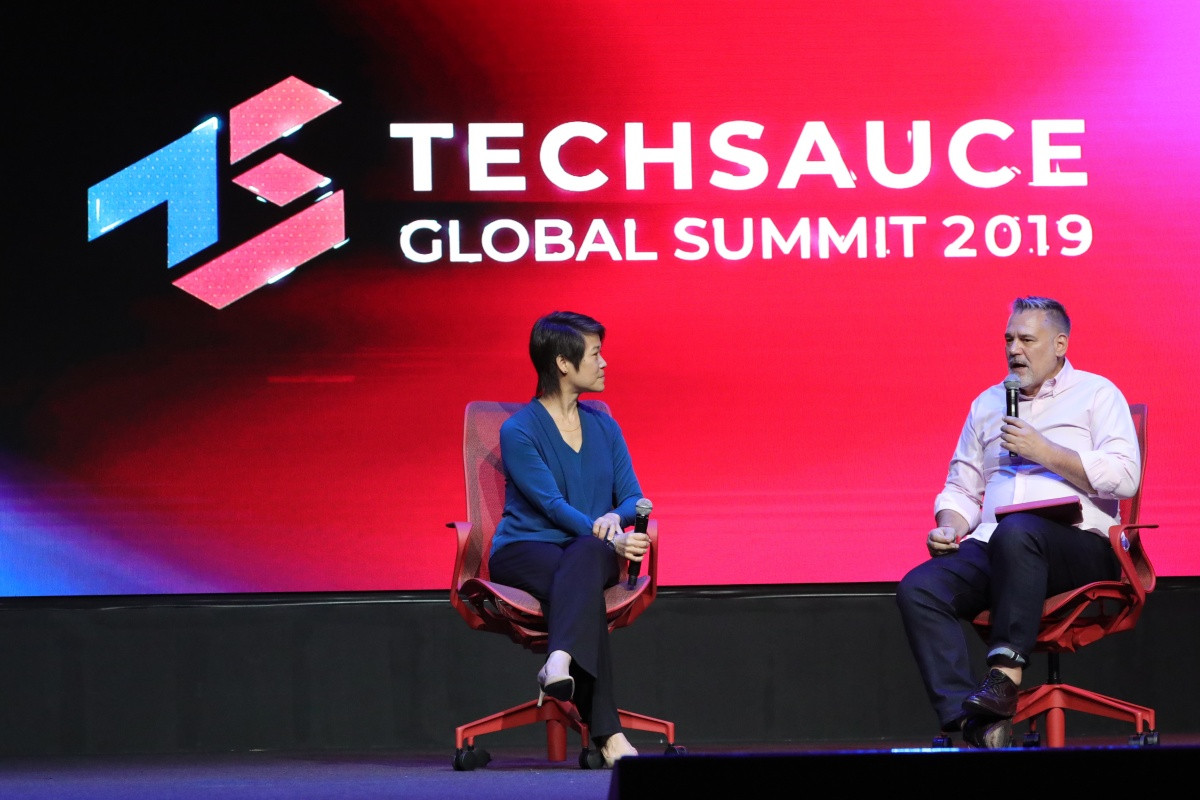Exploring the Social and Cultural Impact of AI

There is little to no doubt that robotics and Artificial Intelligence (AI) will have a huge impact on society as we head into the next century. What that impact will be, and how society will change is anyone’s guess. David and Jeanne sat down at the Techsauce Global Summit to try and address this question.
Jeanne is CEO of the leading company in the field of robotics and AI. Hanson Robotics is the creator of Sophia, the humanoid robot that is familiar to everyone and is known globally from her numerous TV interviews and appearances at tech conferences around the world. David possed some questions to Jeanne to try and address or discuss how AI and robotics will impact us in the next ten to fifteen years.
What are the myths surrounding robotics and its impact on society?
We are too new at the robotics and AI game to say that all myths are incorrect or untrue. There is not enough information to make a flat out a statement regarding fact or fiction. Humans have the tendency to think in black and white; in absolutes. There is the binary myth where the humans will be destroyed or the utopian belief where some people think that we will live harmoniously with robots and coexist with them in an advanced world. However, the reality may be a world where robots and humans are just going to have to learn to live with each other. Hollywood has done a very good job of promoting the dystopian viewpoint and we need to work on getting a better perspective.
When people think of robots, they visualize humanlike creations but automotive robots in the market place now don’t look like humans at all. What is the purpose of making robots look like humans?
The main reason for not many humanlike robots is due to the thirty-year-old theory by Masahiro Mori who is a roboticist. His theory states that affinity is presented on the Y-axis and human likeness is on the X-axis. According to Mori the less humanlike the robot, the fewer affinity people will have for the creation. Once you give a robot a more human face, the affinity towards the creation will increase.
It is a matter of design and we have learned a lot from Sophia and how she engages with people. People are more attached to her and engage more freely with her.
Do you think we as people will get over our disconnect with robots or will become more comfortable with automation?
Yes, I think people will become more open to it. Take a look at Alexa Echo, that is a cylinder. It captures a lot of transactional data but how much emotional data does it capture? No one really knows as some people may display a lot of emotional attachment to their Alexa but many others do not. However, with Sophia’s design, we designed her to be a friend. Her form elicits from people a true emotion. People become emotionally attached to her and people tell her authentically what they are thinking. They don’t just order her around, there is a deeper connection. We are trying to build a beneficial and benevolent connection between human and machine, and it is accomplished through her design.

How do you decide how human Sophia is?
We are not there yet. We built Sophia with the best intentions. We built robots that are benevolent but we view robot and AI building in the same way as raising a child. You raise your child the best way you know how and prepare them for the world as best you can, however, it is up to that child how they handle the world as an adult with the knowledge you have given them. You hope they make the sort of decisions that will make them valuable members of society. We certainly don’t have all the answers when it comes to robot development and for this reason, it is important for society to connect with AI and developers.
The processing and decisions that Sophia is making are clearly valuable, who owns that data? Does Sophia own that data?
Sophia is not self-aware; she is not conscious. We have a team of character developers who ensures that she has a good character. Sophia has a full character profile and whenever she goes out and learns, the learning is filtered through the character set. She is constantly learning social interactions and the way people converse. There is a huge gap between learning and becoming self-aware. How long will it take for robots to become self-aware? No one knows some people believe it will happen in ten years, some people believe it will be in twenty years and some believe that it will never happen.
How do we make sure the dystopian myth or view never happens?
For students, I would advise that they focus their education on analysis and interpretation. The data created by AI will need to be interpreted and organised. We will need people with more critical thinking skills.
I would also advise politicians to focus their efforts on education and preparing the next generation to cope with AI. Regulation of AI or robotics is the wrong conversation politicians are having, we should be improving education initiatives.
For investors, I would advise focusing their efforts on the core tech. What is the driving innovation and tech moving AI and robotics forward? Once you find that out, use your resources to drive and push that technology and innovation.
Ultimately, when addressing the impact of AI and robotics on society on the future, the answer lies with us. We, society, decide how this technology is going to be used, for what purpose will it be used and the extent of its use in society. The voice of society is powerful in determining the future and impact of automation, AI and robotics.
ลงทะเบียนเข้าสู่ระบบ เพื่ออ่านบทความฟรีไม่จำกัด






